Kenneth Atchity's Blog, page 16
August 12, 2024
Story Merchant E-Book Deal Tony Molina's South Texas Drag

AVAILABLE ON AMAZON
Take a trip through the South Texas terrain through the eyes of drug runner, Toño Garcia. His distinctive South Texas slang adds a unique charm to this dark story, but the appeal and originality doesn’t stop there. This guy knows more about style than Carrie Bradshaw, which adds massive flavor and a whole new twist to a tale about “crime as a way of life” in South Texas.
Toño sets the mood of every scene by describing the sagebrush and cactuses, the 100-degree heat, the dusty roads, and winding rivers. He sets the mood, too, cluing us into memories, his history. These tales—from the time he had to smuggle prize-winning horse jizz across the border, to the 55-gallon tanks that serve as human caskets for his “colleagues” the Bass brothers when drug deals go wrong—come together to show us that Toño is trapped, but surviving the best he can.
Toño puts on his favorite Bed Stu boots for this particular job—he must kidnap the girlfriend of El Commandante, in order to save his own life. Toño killed the one of the cartel’s son’s six months back in self-defense with his lucky tanto blade. You see, ain’t nobody better with a knife than Toño, expect maybe his uncle, El Maestro, the man who ordered this job.
Toño can’t go this alone. He calls on his crew: Rigo and Paco, and Jay—a bigtime ex con, old school drug runner, retired now, most of the time. Loyalty and self-preservation are everything to these guys. After all, that’s all they’ve got, well, that and drug running.
But things don’t go as planned. The girl they kidnap is not “the girlfriend.” It appears the whole job is a setup. Toño must go off the grid, in order to save his bros, his crew, his own life. Just another day in South Texas.
What readers are saying about South Texas Drag
Loved the book! I love the way the author paints pictures so vividly with just words. Everything he described brought the image to mind. The language and dialogue were spot on. Interesting characters, good, strong plot and a story that just flowed. A real page turner. I hope there is a sequel or even a prequel. Should be very interesting since I am strangely bonded with the characters. I want to know more about them. ~Norma
... first effort at writing fiction and it is extremely good. Not only is his story telling accomplished...but the book is also well edited. ~Larry Wattson
Suspenseful development of a likable character. Plot twists and ironic turns keeps the reader engaged and turning pages to learn what happens next. A very good read! ~Amazon Reader
I couldn't put it down. This book is filled with suspense as the reader is immersed in the seedy culture of the south border drug trade. The author creates vivid characters who jump to life and have you on the edge of your seat. This book is a real page turner. Highly recommended! ~Rick Wade
What an absolute blast this book was to read. It is different from anything else out there and so engaging. You can't help but admire, and respect this crew of funny, complex, and very real criminals. Deep South Texas is truly a world unto itself, and this book captures it perfectly. Tony Molina, you create vivid imagery with your style and masterful use of language. As a fellow Texas LEO, I can see your police background in your writing, and I bet your incident reports were fun to read back in the day. You have chosen the right path for your next career....I look forward to more great stories from you! ~Pete Bacon
 About the author
About the authorTony Molina was born in Laredo, Texas. He lived in the small town of Zapata where the setting of the novel was canvassed. Tony's debut novel captures the imagination of the reader with intimate imagery and unique language. Tony became a police officer in Arlington, TX and spent 13 years working with the SWAT Team and four years as an undercover detective. His experience as a vice and narcotic detective and SWAT member was invaluable in creating an intimate and authentic portrayal of the South Texas Drag a way of life. He is retired and "living the dream" as they say.
August 9, 2024
From Mother Jones Archives, an Excerpt From Maxine Hong Kingston
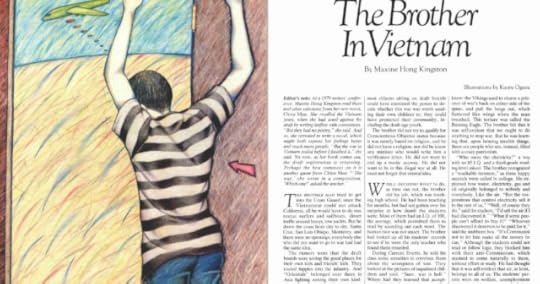
In Maxine Hong Kingston’s “The Brother in Vietnam,” which Mother Jones excerpted in 1980, the main character is simply “the brother.”
It is the Vietnam era. The draft looms. He, “the brother,” does not have a religion, a wife, a physical disability, or a desire to go to war—he has only a job teaching high school in California. So “the brother” does that, at first; he teaches. The brother waits to be called up to the war. He hopes not to be. He spouts a bit of anti-capitalism to his students in the meantime. Kingston writes:
During Current Events, [the brother] told his class some atrocities to convince them about the wrongness of war. They looked at the pictures of napalmed children and said, “Sure, war is hell.” Where had they learned that acceptance? He told them the worst torture he knew: the Vikings used to cleave a prisoner of war’s back on either side of the spine, and pull the lungs out, which fluttered like wings when the man breathed. This torture was called the Burning Eagle. The brother felt that it was self-evident that we ought to do anything to stop war. But he was learning that, upon hearing terrible things, there are people who are, instead, filled with a crazy patriotism…
He explained how water, electricity, gas and oil originally belonged to nobody and everybody. Like the air. “But the corporations that control electricity sell it to the rest of us.” “Well, of course they do,” said the student; “I’d sell the air if I had discovered it.” “What if some people can’t afford to buy it?” “Whoever discovered it deserves to be paid for it,” said the stubborn boy. “It’s Communist not to let him make all the money he can.” Although the students could not read or follow logic, they blocked him with their anti-Communism, which seemed to come naturally to them, without effort or study.
Some have written that “the brother” is likely Kingston’s own brother. Her work often swirls into an autofiction, as Hua Hsu wrote in a profile this year in the New Yorker. This roots Kingston’s story in a tangible haze of guilt. Perhaps one we all recognize today.
Hsu’s article begins where most do with Kingston: her iconic The Woman Warrior, which “changed American culture.” He describes the process of her writing the book—she burned out on Berkeley counterculture, moved to Hawaii, and, on vacation in Lāna’i, Kingston in 1973 began writing by moving a desk to face the wall. There’s a shrewd lesson there.
But it is his description of her process of writing her second book—China Men, a series of stories about immigrant men published in 1980, which includes “The Brother in Vietnam”—that caught me, and made our excerpt make more sense. He writes:
When she completed “China Men,” she and [her partner] flew to New York. After reading the manuscript, [her editor] told her that she had failed. “You don’t understand men,” she remembers him saying. “They’re lonelier than this.”
Devastated, Kingston got on a bus uptown to her friend Lilah Kan’s apartment, where she and Earll were staying. “I just felt terrible,” she said. She was met by [friends] who greeted her with champagne and pot to celebrate her big meeting. They went ahead with the party, as she retreated into the corner with her Selectric typewriter and wrote a scene based on her father’s time in New York. So much of the immigrant story is joyless hard work. America is so free that you are even free to work through the holidays, Kingston wrote. She wanted to give the immigrant workers a day off. Her father enjoys a night out on the town, ending up at a tearoom, where Chinese men could buy dances with white women. Her father fox-trots with as many blondes as he desires, then returns home alone, wondering if his wife will ever make it to America.
This work follows a similarly sly trajectory. Unsure what to do, Kingston’s “brother” actually enlists in the Navy. “He arrived at his decision by reasoning like this,” she writes. “In a country that operates on a war economy, there isn’t much difference between being in the Navy and being a civilian.” If every microwave purchase fuels the bombs what point is there?
Yet the brother cannot fully give up his hatred of the Vietnam War. As much as he tries to give in, Kingston finds that the brother keeps fighting: in small, subtle ways. It is the “sadness” of men that her editor wanted. But the strength too.
The brother cannot fully go limp, cynical, and evil. He is complicit, yes, in war, but never wages it fully. In Vietnam, as part of the Navy, he refuses to kill. And he refuses to die. Sometimes we must just survive.
Via Mother Jones
August 7, 2024
Dennis Palumbo - The Creative Therapist with Terry Shepherd
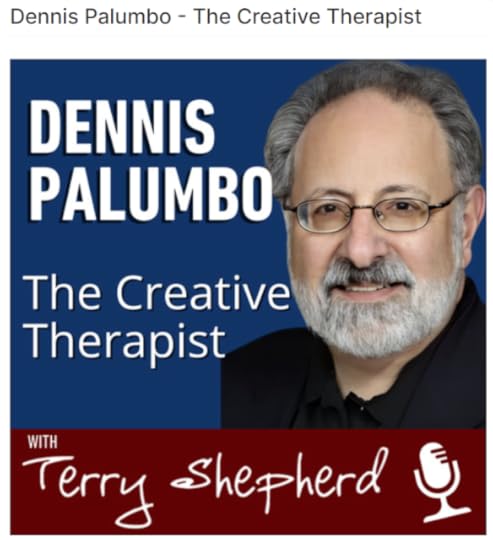
Dennis Palumbo is one of those renaissance men that make the rest of us feel like slackers. We discuss his years in Hollywood, his Daniel Rinaldi mysteries, his career as a therapist who works with creatives, his involvement with the Hulu Steve Carell vehicle, "The Patient" and his memories of the late great Bob Newhart. It's a conversation I believe is one of the most profound of my author interview series.
August 5, 2024
How to Design Your Novel For Film Adaptation
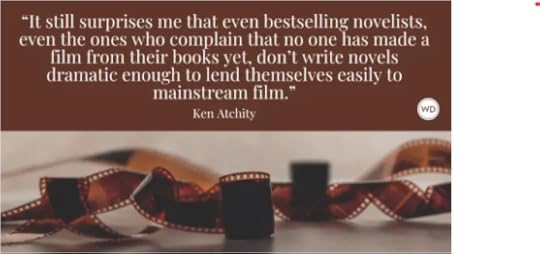
Mid-career novelists seeking representation complain that none of their books have been made into films. At any given moment, we in Los Angeles have literally stacks of novels from New York publishers on our desks. Going through them to find the ones that might make motion pictures or television movies, we—and other producers, managers, and agents—are constantly running into the same problems.If you regard your writing career as a business, you should be planning your novel at the drawing board to make it appealing to filmmakers. Here's how.Common Problems in Novel-To-Film Adaptation“There’s no third act…it just trickles out.”“There are way too many characters and it’s not clear till page 200 who the protagonist is.”“I can’t relate to anyone in the book.”“At the end, the antagonist lays out the entire plot to the protagonist.”“There’s not enough action.” Not just action but dramatic action.“There’s nothing new here. This concept has been used to death.”/“We don’t know who to root for.”“The whole thing is overly contrived.”“There’s no dialogue, so we don’t know what the character sounds like.”“There’s no high concept here or a new way into a familiar concept. How do we pitch this?”“There’s no real pacing.”“The protagonist is reactive instead of proactive.”“At the end of the day, I have no idea what this story is ”“The main character is 80, and speaks only Latvian.”“There are no set pieces.”
Of course anyone with the mind of a researcher can list a film or two that got made despite one of these objections. But for novelists who are frustrated at not getting their books made into films that should be small consolation and is, practically speaking, a futile observation. Yes, you might get lucky and find a famous Bulgarian director, who’s fascinated with the angst of octogenarians, studied pacing with John Sales or Jim Jarmusch, and loves ambiguous endings.
But if you regard your career as a business instead of a quixotic crusade, you should be planning your novel at the drawing board to make it appealing to filmmakers.
Characters are the most important element of the story and should generate the action, the setting, and the point of view. Your job as a writer is to give us insight into each and every character in your story, no matter how evil or virtuous his or her actions may be. Characters are the heart of the drama.
Have someone in the film industry read your synopsis or treatment before you commit to writing the novel.
Revise accordingly.
Though I’ve observed the phenomena for several decades now, it still surprises me that even bestselling novelists, even the ones who complain that no one has made a film from their books yet, don’t write novels dramatic enough to lend themselves easily to mainstream film. It’s a well-known, but lamentable, phenomenon in publishing that, with very few exceptions, the more books a novelist sells the less critical his publisher’s editors are of his work. So time and again we read novels that start out well, roar along to the halfway point, then peter off into the bogs of continuous character development or action resolution.
A publisher invests between $25,000 and $100,000 or more in publishing your novel. A low-budget feature film from a major Hollywood studio today costs at least $50 million. There is, from a business point of view, no comparison. Risking $50 million means the critical factor is raised as high as can be imagined when your book hits the “story department”—much higher than the critical factor of even the biggest publishers. Hollywood studies what audiences want by keeping track, in box office dollars, cents, and surveys–what they respond best to.
If you want to add film to your profit centers as a novelist, it would behoove you to study what makes films work. Disdaining Hollywood may be a fashionable defense for writers who haven’t gotten either rich or famous from it, but it’s not productive in furthering your cinematic career or building your retirement fund.
via Writer's Digest
Brian A. Klems is the editor of this blog, online editor of Writer’s Digest and author of the popular gift bookOh Boy, You’re Having a Girl: A Dad’s Survival Guide to Raising Daughters.
Follow Brian on Twitter: @BrianKlems
Sign up for Brian’s free Writer’s Digest eNewsletter: WD Newsletter
Listen to Brian on: The Writer’s Market Podcast
August 2, 2024
Dennis Palumbo's Essay "The Patient" and My Patients Essay in the Summer issue of CAPITAL PSYCHIATRY.
Dennis discusses his role as Consulting Producer on the recent Hulu TV series, THE PATIENT, and how the fact that the therapist character (played by Steve Carell) looked somewhat like him.
This essay details the impact---some of it quite surprising---that this had on his therapy patients.
DENNIS PALUMBO, MA, MFT, is a licensed psychotherapist in private practice, specializing in creative issues. He co-wrote the screenplay for the award-winning My Favorite Year and other films, numerous TV episodes and pilots, and the novel City Wars.
July 31, 2024
Book Trib Reviews Lee Lindauer's New Novel The Sava Steps

The Sava Steps by Lee LindauerWhat's It About?Amidst desolate mountaintops, a cast of characters find their fates entwined in this pulse pounding thriller
“Where would one go to sell a kidney?” Hightower asked.
Vlad leaned back; his expression turned sour. “People get killed wanting to know.”
Author Lee Lindauer, an engineer by trade before turning to thriller novels, uses the tools and techniques of his original vocation to develop well-researched and tightly conceived stories and complex and well-defined characters, clearly evident in his most recent work, The Sava Steps.
Throw in a generous helping of history to get the narrative going. During the Bosnian War in 1995, in a period referred to as the Srebenica Genocide, a Dutch Battalion of the United Nations Protective Force, known as Dutchbat III, was charged with providing peacekeeping operations, protecting the “safe zone” and preventing the escalation of atrocities on local villagers. It is said that the Dutch did not live up to that responsibility.
The protagonist, Melika Zbanic, 17 at the time and one of those villagers, was forced into a long journey by foot with her younger brother against their will at the hands of armed soldiers. The battalion’s Dutch captain, Pieter Van Dere, made decisions and took actions that left lifelong scars on Melika – so hideous that she vows decades later to settle all scores and seek out revenge on Van Dere, regardless of the consequences.
Fast forward to present day, where Melika, a doctor, lives in a small village. On the grounds high above her clinic, there is a structure of a once-prominent hotel whose presence now is unclear. However, as she witnesses strange comings and goings, even the apparent nighttime burial of a body, she suspects something unsavory. Yet she is singularly focused to travel wherever she may to find Van Dere and bring about her personal justice.
THE PACE IS SWIFT, WRITING CRISP
Meanwhile, an analyst for Interpol in Lyon, France, is close to cracking a case and identifying a suspect in an apparent illegal kidney trafficking operation – the savage process of grabbing donors and taking vast sums from people in need of a transplant who can’t procure the organ through traditional means.
When the analyst is murdered, enter Thorne Hightower, a former disgraced FBI agent who happens to be the brother-in-law of the victim. Van Dere, whose current cover is a position at Interpol, now appears central to the kidney trafficking scheme.
Melika and Hightower, with seemingly different motives for seeking out Van Dere, become intertwined in the chase and subject to many dangerous twists, turns and circumstances in which they find themselves along the way.
The author introduces us to an intriguing cast of supporting characters representing both good and evil. Perhaps none is more curious than Melika’s daughter Valery, for the mere reason that she is stone deaf but also a virtuoso violinist. What role might she play close to home as her mother takes off in search of Van Dere and his accomplice?
INTRICATE PLOT WITH FINE DETAIL
Like many of the relationships, with that of Melika and Hightower at the forefront, the matter of trust is a constant theme. While some wavering confidences are apparent, even the two lead characters fail to easily establish what seems like a natural bond to work together. Perhaps Melika’s history, shrouded with shady characters and betrayal, forces her to question everything and anything.
Lindauer has truly taken to his new craft of writing thrillers: “They’re an easy way to escape, and someone is always in danger — it never is the reader. I was never a voracious reader growing up, but the books I did read were packed with adventure, thrills, and mayhem, with words and characters that got your blood flowing.”
The Sava Steps will indeed get readers’ blood flowing. The author has combined an intricate plot with fine detail and much to think about. He gives us complex, flawed characters for which we feel their anguish, fear, desperation and the focus on the specific objectives at hand.
Dare we say that Lindauer has “engineered” a masterful work with all the elements you’d hope for in a thriller. The pace is swift, the writing crisp, and the overall experience one that will encourage readers of this genre to proudly add this book to their shelves.
AUTHOR
Contrary to popular belief, Lee Lindauer, author of The Sava Steps and Irrational Fears, did not obtain an MFA in Creative Writing but did earn both BS and MS degrees in Architectural and Civil Engineering, respectively. From years of designing buildings and other structures, he now engineers fast-paced plots and creates intriguing characters in authentic technical and natural settings to produce emotional rollercoaster rides for the reader. A member of the International Thriller Writers, he and his wife, Teri, divide their time between Colorado and Nevada. Visit his website at www.leelindauer.com
 Jim Alkon
Jim AlkonJim Alkon is Editorial Director of BookTrib.com. Jim is a veteran of the business-to-business media and marketing worlds, with extensive experience in business development and content. Jim is a writer at heart – whether a book review, blog, white paper, corporate communication, marketing or sales piece, it really doesn’t matter as long as he is having fun and someone is benefitting from it.
July 29, 2024
Story Merchant E-Book Deal!

AVAILABLE ON AMAZON
Original, entertaining, deftly scripted with memorable characters and a roller-coaster of a plot…
--Midwest Book Review
Twenty-five years after the Srebrenica Massacre, the worst genocide in Europe since World War II, survivor Melika Žbanić encounters two vicious men from her past. Intent on revenge, her plans are derailed by disgraced FBI agent Thorne Hightower, who has personal reasons to involve himself in her affairs.
Melika escapes Hightower’s pursuit only to be kidnapped and taken somewhere in the Balkans where a grim fate looms. With the clock ticking, a persistent Hightower follows clues to her whereabouts—and by chance meets Melika’s daughter Valery, a physically impaired but gifted young woman determined to confront her own existence—and soft-spoken Victor Alvarez, whose sole purpose in life is to keep his wife alive. Amid the splendor of a desolate mountaintop nouveau riche hotel, they find themselves locked on an emotional collision course between brutality, and the GIFT OF LIFE.
July 26, 2024
DREAMWORKS: THE BROTHER IN VIETNAM Maxine Hong Kingston

THE BROTHER IN VIETNAM
Maxine Hong Kingston
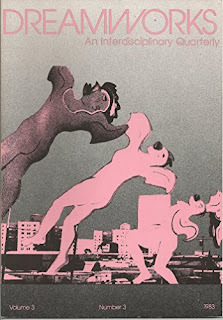 When I went to Singapore, where I have maybe fifty relatives, I found part of the family that my mother left behind forty years ago, and never saw again, and will probably not see again. My newfound aunt told me she had dreamed that the ghost of her husband had escorted me to Singapore. "And what does your mother dream about?" she asked. I understood that if I am to know someone well, I have to know what she dreams about. Dreams are more telling than news about one's job or health. I told my mother's dreams, and so felt that I am a worthy connection between family members who are far apart.
When I went to Singapore, where I have maybe fifty relatives, I found part of the family that my mother left behind forty years ago, and never saw again, and will probably not see again. My newfound aunt told me she had dreamed that the ghost of her husband had escorted me to Singapore. "And what does your mother dream about?" she asked. I understood that if I am to know someone well, I have to know what she dreams about. Dreams are more telling than news about one's job or health. I told my mother's dreams, and so felt that I am a worthy connection between family members who are far apart.To write thoroughly about people, tell not only what work they do but how they spend their days off, and tell what they dream. In the following excerpt, "The Brother in Vietnam," the brother has three nightmares as his ship sails to Asia. The on-scene killings that take place in this story occur in dreams.
From CHINA MEN
My mother holding my hand, I went through a curtain into a dark, out of which came explosions and screams, voices shouting things I did not understand. In a rectangle of light—which grew and shrank according to how close or far away I thought it—men with scared eyes peered over the top of a big hole they were in. Helmets weighed down their skulls. Their cheekbones were black. The men ran, clutching guns, and fell, and crawled.
The explosions rolled them screaming on the ground. I saw the undersides of their boots. Their faces and hands were not flesh-color. Everyone wore the same outfits. The color had gone out of the world. I stumbled tanglelegged into my mother's skirt and the curtain and screamed with the soldiers. Suddenly they were all gone like a dream, and I was crying in the street. Years later I figured it had only been a movie, a war movie, an old sepia-tone. "Did you take me to an American movie when I was a baby?" I've asked. Usually my father took us to American movies, my mother to Chinese movies, where she could visit with friends during the boring parts, and children played and shouted without getting ejected. MaMa said, "You cried so much that the usher ghost threw me out of the theater." I worried about making her waste money on a ticket, and so she diverted me from the actual horror—I had seen a vision of war. . . . from her.
So that was how babies were born. Our room turned white, and through the window flew a white Christmas card like a dove and landed on the floor. It had fluttered in the air. Forgetting about what we had seen through the cracks, my sister and I picked up the card. It was very beautiful with snow and sparkles. "There's no envelope," we said. "No stamp. No name. No mailman. How could it come through the window?" I checked the window; someone must have snuck up to the open window and thrown the card in. But screen and glass were shut tight against the winter. "You saw it too, didn't you?" my sister and I asked each other, our brother only about a year old and no help. "Yes, it flew through the glass near here." We pointed out the pane, one of the top ones. "How did this card come into the room?" we asked when an adult entered. "The baby's born," said the adult. That baby was my brother who was born on Christmas day.
Later the adults said that they found him naked under a pine tee, but I know what I had seen: blood and a flash of white flying, a flash of flying white. . . . . One brother got married a few months before the draft exemption for married men was canceled. But one brother enlisted in the Navy and the other was commissioned as an officer in the Air Force. I drove my youngest brother to the airport in the middle of the night. He didn't want the flowers I brought; he had already refused to carry the chickens and puddings that MaMa had cooked. He was in his uniform like the middy that he wore in his baby picture. He said not to wait for him to board or for the plane to take off. "Go on," he said. "Don't wait around." So I only got to see him check his luggage. As I drove past the terminal, I saw him sitting by himself on a cement bench under a light. . . . He was assigned to a ship, an aircraft carrier.
The beams and cables of the Golden Gate Bridge swung overhead. A few people up there waved and gave the peace sign. The Bay was gray like the pewter-color rocket launchers bolted to the decks. For a frantic second the brother wanted to turn the ship around. It was like a moving island of planes and jeeps and tanks. Maybe those khaki torpedoes and silver rockets were H-bombs. Or they were flares. He didn't know what an H-bomb looked like, perhaps a cassette or a crystal chip. . . . As the ship moved toward Asia, he dreamed fiercely.
The dreams came more and more quickly; the land sent them: An army enters a city to free it from an enemy. A soldier of the rescuing army, he walks through a castle into the dungeons. Going down the stairs, he sees at face level—bodies hanging, some upside down, some brown and dried up, black hair and arms swaying, feet turning this way, then that, bodies with black hair in their middles, corpses with sections missing and askew, but mercifully all dead, hanging by hooks and ropes. Laundry tubs drain beneath the bodies.
The live women and children on the ironing tables, the last captured, are being dissected. It has to be a dream or a movie, he thinks, but he blinks his eyes, and the sights do not go away. He takes up his sword and hacks into the enemy, slicing them; they come apart in rings and rolls. He grits his teeth and goes into a frenzy, cutting whatever human meat comes within range. When he stops, he finds that he has cut up the victims too, who are his own relatives. The faces of the strung-up people are also those of his own family, Chinese faces, Chinese eyes, noses, and cheekbones. He woke terrified. The live bodies he had cut up had not screamed or wept because their mouths had been gagged and eyes blindfolded. Scared awake, he looked at the underside of the rack above him and at the sleeping man across the aisle; it was only the closeness in these berths that had made him dream like that.
He went to sleep again, and another dream recurred: Armies crawl like alligators under barbed wire. They have been ordered to charge a beach like at Normandy—only the beach is as wide as the Sahara Desert or the Gobi or Death Valley. In a panic of attack all those miles, they crawl and charge for years. It is an army of burrowing animals, moles, groundhogs, prairie dogs, ostriches. Frightened by shadows and sounds, they dig deeper. Nursing cubs and kids wriggle beneath bigger animals. Turkeys burrow under one another and die in a pile. Administering first aid, he cuts open their chests and sees gross internal damage. He tries unstacking the animals, weaning them. The alligators, left arm and leg, then right arm and leg, crawl toward battle. Occasionally, a wild stallion rears up and is shot. He woke again, wondering why he should have such disorderly animal dreams when the ship was a machine. These dreams must have come from his years of poultry chores.
When he slept again, he dreamed that he was a barkless dog tied to a table leg in a kitchen equipped with a sink, oven, and operating table. Families—mother, father, and one child—are in kitchens like this all over the world. A voice comes over the loudspeaker: "Children, take up your knives; women, forks; men, spoons." Then with their arms around one another, the wife picks up the fork, and the husband the spoon. The loudspeaker says for them to kill themselves by forking and scooping. "Spoon, knife, or fork?" the loudspeaker asks the barkless dog, who knows that if he took the sharpest instrument, he would deprive someone else of a quick death.
He chooses the spoon, but is not willing to gouge himself to death. Because he is a dog and not watched as closely as human beings, he runs out of the kitchen-surgery, but outside, the shooting war has begun. He runs in and out the door, unable to decide whether it is better to commit suicide or to kill.
Kenneth Atchity. Dreamworks 3:3: 1983 (Dreamworks Magazine) . Story Merchant Books.
July 24, 2024
Interview – Ken Atchity on Brae MacKenzie

Kenneth John Atchity Author of Homer’s Iliad: The Shield of Memory – Which was his Ph.D. Dissertation. The work was awarded Yale Graduate School’s Highest Academic Honor – The Porter Prize; and was later published by Southern Illinois University Press (Edited by John Gardner). Mentors at Yale Included Thomas Ber.
Kenneth John Atchity Author of Homer’s Iliad: The Shield of Memory – Which was his Ph.D. Dissertation. The work was awarded Yale Graduate School’s Highest Academic Honor – The Porter Prize; and was later published by Southern Illinois University Press (Edited by John Gardner). Mentors at Yale Included Thomas Bergin, Thomas Greene, A. Bartlett Giamatti, Richard Ellinger, Eric Segal and Lowry Nelson Jr.
His Twenty Books Include:
Homer: Critical Essays (G.K.Hall), The Renaissance Reader (HarperCollins), The Classical Greek Reader (Harper-Oxford University Press),Italian Literature: Roots & Branches (Yale University Press), A Writer’s Time (W.W. Norton) Seven Ways to Die (with William Diehl) (Story Merchant Books) The Classical Roman Reader (Harper-Oxford), The Messiah Matrix.
Kenneth represents writers of both fiction and nonfiction. He accounts for numerous bestsellers and movies both produced in television and on the big screen. In 2011 he was nominated for an Emmy Award for Producing “The Kennedy Detail.”
We are very pleased to introduce our readers to his latest addition to storytelling which is called Brae MacKenzie.
Ken, Brae Mackenzie is a romance of Mythic Identity. What inspired her story?
I had it in the back of my mind for years, ever since I did a driving tour of Scotland and fell in love with the place and its mysterious past.
What made you decide to try out Romance?
Actually romance, for me, is a ‘return to the old neighborhood.’ My first film project after leaving academia was a series of sixteen romance movies (“Shades of Love”) that allowed me to explore romance from every angle. I’ve been in love with romantic literature since college when I read Denis de Rougemont’s Love in the Western World and realized the power of romantic love over our western imaginations. I conceived of Brae Mackenzie as the first of a series of romances about American women returning to the countries of their origins to discover their true selves in the myths of that country.
How has the audience received the book since its launch last week?
It’s too early to tell. It hasn’t been out long enough for anyone even to read it. I hope your followers will take a look—and write a review on amazon.com
What made you decide to give it a mythical underline?
It wasn’t really a conscious decision. I’ve always loved romance and when I wrote one I wanted to explore my equal fascination with local myths, which form such a strong part of our unconscious minds, our yearnings and questionings.
Can you tell us a bit more about your main character? What makes her relatable?
Like so many contemporary women Brae is juggling so many balls she doesn’t have time and space to question what she’s doing. Beneath it all, though, is that nagging feeling that she’s missing out on life—that there’s something in her depths that isn’t being satisfied.
Can you give us a bit more insight into what it takes for you to write your stories?
I realize, after readying this book for publication, that it takes courage among other things. What if no one likes the story? What if there’s no audience for it? At the end of the day, though, it’s a story that has haunted me for years and I felt it deserved to be out there to make its own way in the world.
Does it involve a lot of research and planning?
I tend to start with a bunch of facts that intrigue me, then find a story to incorporate them. As I write the story, I don’t stop to check out the veracity of the details—I just imagine what the story needs. Then, when I get stuck somewhere, I turn to serious research to get me unstuck and generally discover that the facts I imagined are more accurate than I could have predicted; I also discover facts that I had not imagined, and work them into the story as I go along. Finally when the first draft is done, I do the most serious checking and research which tends to enrich the story. That’s where the serendipity happens—when you discover facts you had no idea were out there and they somehow magically seem to work in your story.
How long does it take from an idea to a full book?
In this case it’s taken 30 years or so. I did the first draft when I was teaching mythology at Occidental College, shoved it in a drawer somewhere as other things took my attention. Found it, when cleaning out my drawers and asked my top editor to read it and tell me what she thought. She insisted I finish and publish it, so I spent a year revising it repeatedly until it was at the point where I needed to get it born and out there on its own to find its fate.
What’s next for Ken the author?
I just finished the first volume of my memoirs, A Story Merchant’s Story: Growing up Atchity. Now I’m working on the second “novel of mythic identity,” this one about a Sicilian-American woman, faced with a crisis in her career, who turns her back on it to go to Sicily for the first time and discover her origins. I love Sicily so much I couldn’t resist it.
What other romance novels are you thinking of?
I love to travel, to learn new things, to eat the local cuisine so I’m hoping to do a Japanese novel, as well as ones set in Ireland, England, France, Spain, Mongolia, maybe Brazil and Mexico.
Where can people look forward to meet you?
I’ll be meeting and assisting writers at the Dublin Writers Conference in June, hosted by Laurence O’Bryann of booksgosocial.com. Sign up at http://thebookpromoter.com/conference/ I’d love to meet your readers there!
Where can readers find the books?
Brae MacKenzie Available on Amazon
Read More at Nadine Martiz's My Addiction-Novels
July 22, 2024
Story Merchant E-Book Deal
Brae MacKenzie, a successful San Francisco painter, is a woman who seems to have it all but who's felt a sense of loss and longing since childhood. Her artistic passion hasn't filled that void, and with the untimely death of her charismatic husband, the old pain resurges.
Brae's father senses his daughter's pain and before she embarks for an exhibit in England he hands her a family heirloom hidden away for years...a letter: "Since you are still among the living, your heart is not broken...follow the map," Brae reads, "to Scotland."
The London exhibit, in its ultra-chic hollowness, prompts Brae into taking and advice of that bewildering letter. She hops a train for Glasgow.
When the train goes through a tunnel and emerges in a forest of "Christmas trees," Brae suddenly feels something. This is her stop; she just knows it.
She met at the station by Damon, a stranger, or perhaps not. He becomes her own personal tour guide to the myths and history of a past she never knew--and to a romance she never dreamed of having.
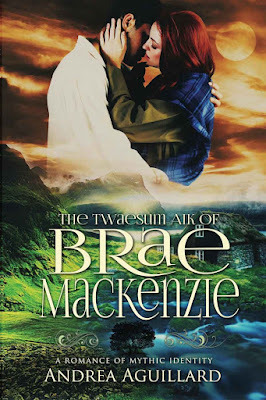
AVAILABLE ON AMAZON



